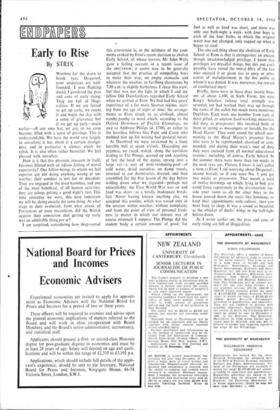Early to Rise
!ER:OP/WEN
By STRIX
How is it that this pleasure, innocent in itself, becomes diluted with an odious feeling of moral superiority? Our fellow-beings to whom we feel superior are not doing anything wrong or un- worthy; their conduct is not lax or decadent. They are engaged in the most harmless, and one of the most beneficial, of all human activities; they are asleep, getting a good night's rest. This time yesterday we were, this time tomorrow we will be, doing exactly the same thing. At what stage in their evolution, from what streak of Puritanism or even masochism, did the British acquire their conviction that getting up early was an admirable thing per se?
I am surprised, considering how deep-rooted this conviction is, at the mildness of the com- ments evoked by Eton's recent decision to abolish Early School, of whose horrors Mr John Wells gave a feeling account in a recent issue of the SPECTATOR; it seems now to be generally accepted that the practice of compelling boys to make their way, on empty stomachs and whatever the weather, to far-flung classrooms by 7.30 a.m. is slightly barbarous. I share this view; but that was not the light in which I and my fellow Old Durnfordians regarded Early School when we arrived at Eton. We had had five years' experience of a far more Spartan regime, start- ing from the age of eight or nine; the arrange- ments at Eton struck us as civilised, almost namby-pamby (a word which, according to the Oxford Dictionary of English Etymology, we owe to Ambrose Philips (d. 1749), or rather to the heartless fellows like Pope and Carey who mobbed him up for writing bad pastoral verse).
At Durnford we were awakened by a loud, horrible bell at seven o'clock. Discarding our pyjamas, we raced, naked, along the corridors leading to The Plunge, queued up and, reaching at last the head of the queue, sprang into a large vat—a sort of mini-swimming-pool—of cold water, dried ourselves on damp towels, returned to our dormitories, dressed, and then assembled for the first lesson of the day before wolfing down what we regarded—perhaps not unjustifiably; the First World War was on and food was short—as a totally inadequate break- fast. Never having known anything else, we accepted this routine, which was varied only in the severest winter weather, without complaint, and from the point of view of personal fresh- ness (a matter in which our interest was of course minimal) I suppose The Plunge did the student body a certain amount of good; for
fuel as well as food was short, and there was only one bath-night a week, with four boys to each of the four baths, in which the original water was not changed, only topped up when it began to cool.
The one sad thing about the abolition of Early School at Eton is that it extinguishes an ancient though unacknowledged privilege. I know that privileges are dreadful things, but this one can't possibly have rotted the moral fibre of the few who enjoyed it or given rise to envy or other causes of maladjustment in the hoi polloi to whom it was denied. It was, moreover, the reward of intellectual merit.
Briefly, there were in those days twenty boys, out of about 1,100, in Sixth Form; ten were King's Scholars (whose total strength was seventy), ten had worked their way up through the ranks of the oafish but much more numerous Oppidans. Each week one member from each of these gifted, or anyhow hard-working, minorities did duty as praepostor; this involved both of them in acting as messengers or heralds for the Head Master. They went round the school sum- moning to the Head Master's presence those who were to be reprimanded, chastised or com- mended, and during their week's tour of duty they were excused from all normal educational routine: including, of course, Early School. In the summer there were more than ten weeks in the term (yes, yes, Floreat, I know it isn't called a term at Eton; I am worrying about Disgusted's second barrel), so if you were No. 1 you got two weeks as praepostor. That meant a total of twelve mornings on which, lying in bed, you could listen rapturously to the degringolade out- side your room as all the other boys in the house poured down the stairs like lemmings to keep their appointments with culture; then you went back to sleep. It was a sound as beautiful as the whicker of ducks' wings in the half-light before dawn.
As I wrote earlier on, the pros and cons of early rising are full of illogicalities.






































 Previous page
Previous page